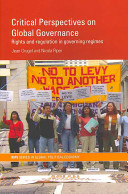
Critical Perspectives on Global Governance
By - Grugel, Jean , Piper, Nicola
Floor
-
Floor 1
Published
-
Routledge, London, 2007
ISBN 10 - 0415361281
ISBN 13 - 9780415361286
Book Status
-
1 Qnty Available with us.
Subject
-
Regionalism (International organization)
Shelf No
-
15
Call Number
-
325.1 GRU
Physical Description
-
xiii, 189 pages ; 25 cm.
Notes
-
Includes Index